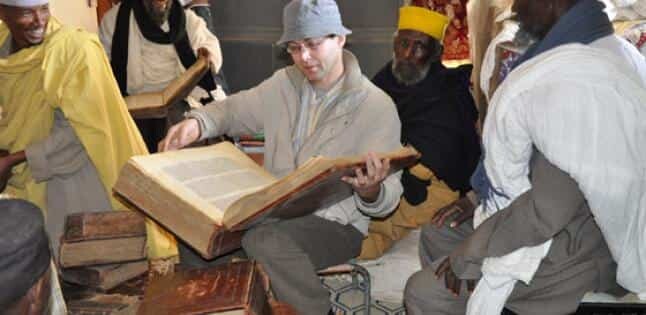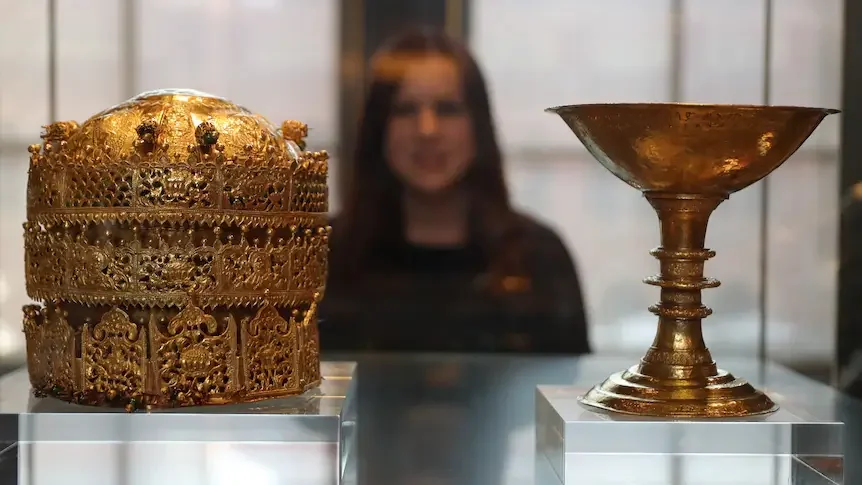By Azeb-Tadesse Hahn/DW
 Experts have noticed a surge in online sales of Ethiopian artifacts. They fear these relics could have been looted during Ethiopia’s ongoing civil war.
Experts have noticed a surge in online sales of Ethiopian artifacts. They fear these relics could have been looted during Ethiopia’s ongoing civil war.
Many Ethiopians were shocked when the news spread that Ethiopian antiquities can be bought on the online marketplace eBay, as well as on other trading sites.
The items listed for sale included centuries-old scrolls and Christian Orthodox bibles, often offered at below-market prices.
One antique manuscript cost just €688 ($754).
Manuscript expert Hagos Abrha Abay, an Ethiopian academic based in Germany, was one of the first to draw attention to the eBay listings when he tweeted screenshots in February highlighting the range of Ethiopian antiquities on offer.
eBay has since removed from their listings a number of Ethiopian artifacts that lack evidence of provenance.
Real or fakes
It is impossible to ascertain from photographs accompanying online listings whether the items are real or fakes — experts have warned for years about the flood of fraudulent antiques posted to eBay and other online sites.
Ethiopia’s government, however, believes the items are probably authentic and has sought help to trace them and get them back.
“Without question, the artifacts are Ethiopia’s heritage,” Ethiopia’s Tourism State Minister, Sileshi Girma, told DW.
Many of the items appear to originate in areas designated as UNESCO World Heritage sites.
He said Ethiopian officials were in contact with UNESCO about the listed items: “We will keep working … to bring back our heritage to Ethiopia. UNESCO will also retrieve the objects from the eBay marketplace.”
War plunder?
There are strong suspicions that numerous Ethiopian antiquities being offered online have been looted during the country’s ongoing civil war between government forces and Tigray fighters, now in its 15th month.
Experts have been warning for more than a year of the plundering of churches, monasteries, mosques and museums in Tigray and neighboring regions in Ethiopia’s north.
While the international airport in the capital Addis Ababa has strict controls, it is a different situation at many of Ethiopia’s border checkpoints, and “people could get away with various things,” government official Sileshi admitted.
The conflict also makes it hard to keep track of religious and cultural artifacts.
Damage and losses unknown
Prominent Ethiopian heritage analyst Henok Seyoum told DW that he had personally witnessed damaged cultural sites in the nation’s north.
“There has been great destruction and looting in this war,” Henok said. “It is still raging in the north and as a result, it is impossible to visit heritage sites even in Tigray.”
Alebachew Desalegn, a London-based private collector of Ethiopian artifacts, is among those who find it plausible that the artifacts were plundered during the war.
“Heritage shows your roots. Heritage shows the history of the country. A campaign against heritage in Ethiopia is itself part of the war,” Desalegn said. “This is unacceptable.”
He accused the federal government of turning a blind eye to the destruction and theft of the country’s priceless heritage throughout the conflict.
“The [Tourism] Ministry must examine all cultural sites that have been looted and report to the Ethiopian people,” he said. “The government must ensure also the return of relics that were looted and taken abroad. It has shown no interest in this issue. It is very sad.”
Tourism State Minister Sileshi Girma told DW that his office is looking into the extent of the destruction and looting and will make its findings public soon.
Ethiopia’s myriad artefacts
Compounding the difficulties of tracing such objects is the sheer volume of Ethiopia’s historical objects. One estimate is that the libraries and archives of Ethiopia’s monasteries containsome 200,000 ancient manuscripts.

















Why is this shocking? Tplf and Orthodox Church clergy have been smuggling hundreds of such artifacts to Europe and America in the past 45 years! Just check the individuals running such businesses abroad and who their handlers are! Think the artifacts leaving the country on Ethiopian Airlines!!
It is true that religious artifacts were stolen throughout Ethiopian history (since menilik digimtam lebaw), not just because these crimes are supported or instigated by political elites. I don’t accept you when you stick it on TPLF. It is only about crooked and wicked church leaders and sometimes by ordinary church members, laity.
However, what makes the current surge of online sales of church artifacts is that it is committed abundantly -many artifacts are stolen in very limited period of time from various towns and villages and sold in mass at an online platform.
You should be surprised if not saddened about it, regardless of your religious and political view-national heritage.
And don’t mess with media or electronic elites who control blogs like this ; they are scrambling for every hot news and stuffing their platform to attract readers.You will be blocked from sites like this or prohibited to show us your thoughts-brainchild. Stop killing innocent civilians , burning sacred human body, temple of God, and robbery and all sorts of torture. fanos should be sent to jail.